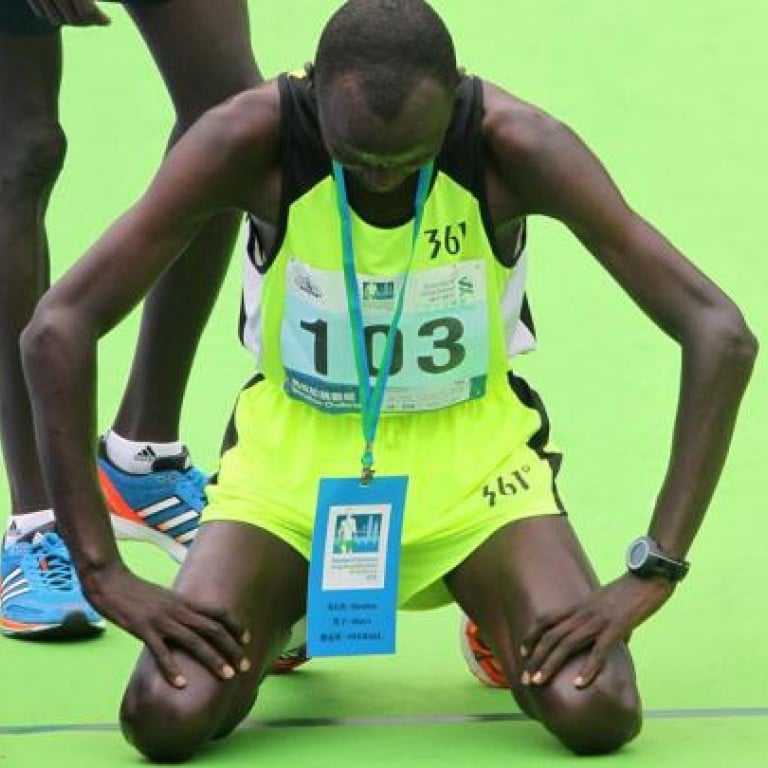
Julius seizes his big moment with victory in Hong Kong Marathon
Kenyan Maisei learns his lessons from two previous defeats and is planning an investment - but not in a bank
The race might be backed by a bank but Julius Maisei's plans for the "life-changing" prize money he won at the Standard Chartered Hong Kong Marathon yesterday is to take the cash and run - as far from a bank as he can.
"I will invest it in buying a plot of land back home and grow tea when I retire from running. Bank it? No chance," said the canny Kenyan after winning the showpiece men's marathon in two hours, 14 minutes and 18 seconds. He pocketed US$57,000.
Not exactly the words a bank, the title sponsor of Hong Kong's biggest participatory sport no less, would want to hear. But Maisei was emphasising the Kenyan way of life. And running marathons is woven into the fabric.
It was third time lucky for Maisei. Last year he finished fourth and in 2011 he came second. On both occasions he broke away from the pack too early, couldn't sustain the pace and was swallowed up by his rivals. Yesterday, he not only had it all well planned out in his mind - the race tactics as well as how to invest the money - but he also executed it perfectly.
"I went for it around the 39-kilometre mark, a little later than on my last two occasions here. I really pushed myself and it worked," said Maisei. "I was afraid I would get caught again and that gave me more energy. I had learned my lessons well."
Fellow Kenyan James Mbugua tried to challenge Maisei, but didn't have the legs in the final spurt to finish 10 seconds behind in 2:14:28. Ethiopia's Deribe Robi was third in 2:14:37.
It was a far cry from last year when seven runners smashed a 14-year-old course record with Ethiopian Dereje Abera winning in 2:11:27. The runner-up also had the identical time and, for the first time, organisers had to examine body positions to decide Abera had edged out his rival. Organisers said then the new course record was all down to money thanks to a near 50 per cent increase.
Money is a powerful motivator, especially for African athletes, where one dollar can go a long way. And Maisei was gleefully counting his chickens.
"I won't be able to take home the entire US$57,000, maybe around 75 per cent as I will have to pay tax to the Hong Kong government as well as pay my manager. But it is still a lot of money and will change my life. I plan to invest it wisely. This will give me a good income when I retire."
But retirement is still far away for the 32-year-old. He is looking at Europe where the really lucrative races are held, and running in more favourable conditions.
"So far all my marathons have been in Asia. I have run in Thailand, in China and in Macau, and this is my third visit here. It is tough running in Asia for the air is not so good. Perhaps it is better in Europe, but I love coming to Hong Kong. This is the hardest race of all and it gives me more satisfaction to win," Maisei said.
Hong Kong's Western Harbour Tunnel has always been one of the biggest obstacles for runners. "Running inside a tunnel for three kilometres is not nice," he said. "And then the course is very hilly. This is why it is hard to produce good times in Hong Kong."
Last year, Maisei was among the group who broke the record and claimed a time bonus. This time organisers offered US$10,000 for any runner who broke 2:12. No one achieved that goal. But Maisei was still celebrating his good fortune.
In the women's marathon, defending champion Misiker Demissie of Kenya retained her crown in 2:30:49. In second place was Ethiopia's Makda Harun (2:31:20) and North Korean Kim Kuk-ok was third (2:32:21).

